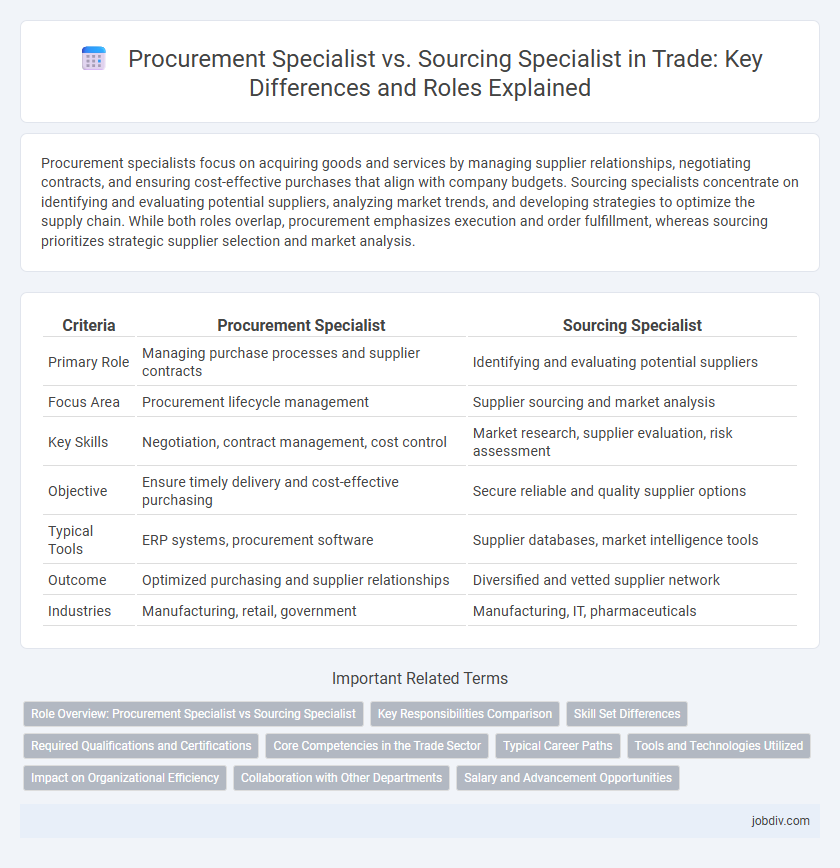Procurement specialists focus on acquiring goods and services by managing supplier relationships, negotiating contracts, and ensuring cost-effective purchases that align with company budgets. Sourcing specialists concentrate on identifying and evaluating potential suppliers, analyzing market trends, and developing strategies to optimize the supply chain. While both roles overlap, procurement emphasizes execution and order fulfillment, whereas sourcing prioritizes strategic supplier selection and market analysis.
Table of Comparison
| Criteria | Procurement Specialist | Sourcing Specialist |
|---|---|---|
| Primary Role | Managing purchase processes and supplier contracts | Identifying and evaluating potential suppliers |
| Focus Area | Procurement lifecycle management | Supplier sourcing and market analysis |
| Key Skills | Negotiation, contract management, cost control | Market research, supplier evaluation, risk assessment |
| Objective | Ensure timely delivery and cost-effective purchasing | Secure reliable and quality supplier options |
| Typical Tools | ERP systems, procurement software | Supplier databases, market intelligence tools |
| Outcome | Optimized purchasing and supplier relationships | Diversified and vetted supplier network |
| Industries | Manufacturing, retail, government | Manufacturing, IT, pharmaceuticals |
Role Overview: Procurement Specialist vs Sourcing Specialist
Procurement Specialists manage the entire purchasing process, including supplier negotiation, contract management, and ensuring compliance with company policies to secure goods and services at optimal cost. Sourcing Specialists focus primarily on identifying, evaluating, and selecting suppliers based on quality, price, and delivery performance to align with strategic business goals. Both roles require strong market analysis skills, but Procurement Specialists emphasize transactional efficiency while Sourcing Specialists drive supplier relationship and cost optimization strategies.
Key Responsibilities Comparison
Procurement Specialists manage the end-to-end purchasing process, including vendor selection, contract negotiation, and order fulfillment, ensuring cost efficiency and compliance with company policies. Sourcing Specialists focus on identifying and evaluating potential suppliers, conducting market research, and developing strategic sourcing plans to secure quality materials at optimal prices. Both roles collaborate closely but differ in scope, with Procurement Specialists handling transactional activities and Sourcing Specialists emphasizing supplier relationship management and market analysis.
Skill Set Differences
Procurement Specialists excel in contract negotiation, supplier relationship management, and cost control, emphasizing purchase order processing and compliance with company policies. Sourcing Specialists focus on market analysis, supplier evaluation, and strategic sourcing to identify and qualify potential vendors, driving supply chain optimization. Both roles require analytical skills, but Procurement Specialists prioritize operational execution while Sourcing Specialists emphasize supplier discovery and risk assessment.
Required Qualifications and Certifications
Procurement Specialists typically require a bachelor's degree in supply chain management, business administration, or a related field, along with certifications such as Certified Professional in Supply Management (CPSM) or Certified Procurement Professional (CPP). Sourcing Specialists often need expertise in market analysis and vendor negotiation, with preferred qualifications including a degree in business or logistics and certifications like Certified Sourcing Professional (CSP) or Six Sigma Green Belt. Both roles benefit from skills in contract management, strategic sourcing, and proficiency in procurement software to enhance supply chain efficiency.
Core Competencies in the Trade Sector
Procurement Specialists excel in contract negotiation, supplier relationship management, and purchase order processing, ensuring cost-effective acquisition aligned with company policies. Sourcing Specialists focus on market research, supplier evaluation, and strategic sourcing to identify quality vendors and optimize supply chain efficiency. Both roles require strong analytical skills, knowledge of trade compliance, and proficiency in procurement software to drive operational excellence in the trade sector.
Typical Career Paths
Procurement Specialists often advance into roles such as Procurement Manager or Supply Chain Director, leveraging their expertise in vendor negotiation and contract management. Sourcing Specialists typically progress to Strategic Sourcing Manager or Category Manager positions, emphasizing supplier evaluation and cost optimization. Both career paths demand strong analytical skills and industry knowledge to drive efficient procurement processes and supplier relationships.
Tools and Technologies Utilized
Procurement Specialists leverage enterprise resource planning (ERP) systems such as SAP and Oracle to manage supplier relationships, purchase orders, and contract compliance efficiently. Sourcing Specialists utilize advanced analytics tools, e-sourcing platforms like Ariba, and market intelligence software to identify cost-saving opportunities and evaluate supplier performance. Both roles integrate procurement software automation but differ in focus, with Procurement Specialists streamlining transactional processes and Sourcing Specialists emphasizing strategic supplier selection through data-driven insights.
Impact on Organizational Efficiency
Procurement Specialists streamline organizational efficiency by managing purchasing processes, ensuring cost-effective acquisition of goods and services while maintaining supplier relationships. Sourcing Specialists enhance efficiency by conducting market analysis, identifying optimal suppliers, and negotiating contracts to secure the best value and quality. Both roles drive operational success by reducing costs, mitigating risks, and optimizing supply chain performance through strategic vendor management.
Collaboration with Other Departments
Procurement specialists collaborate closely with finance, legal, and operations teams to ensure cost-effective purchasing aligns with company budgets and compliance standards. Sourcing specialists work alongside product development, supply chain, and quality assurance departments to identify and evaluate suppliers that meet specific technical and quality requirements. Effective interdepartmental collaboration enhances overall supply chain efficiency, mitigates risks, and supports organizational goals in trade operations.
Salary and Advancement Opportunities
Procurement Specialists typically earn a median salary ranging from $60,000 to $85,000 annually, reflecting responsibilities in contract negotiation and supplier management. Sourcing Specialists often command salaries between $65,000 and $90,000, driven by expertise in market analysis and supplier identification. Career advancement for Procurement Specialists may lead to roles such as Procurement Manager or Director, while Sourcing Specialists can progress into Senior Sourcing or Supply Chain Strategy positions, both paths offering significant salary growth and leadership opportunities.
Procurement Specialist vs Sourcing Specialist Infographic

 jobdiv.com
jobdiv.com